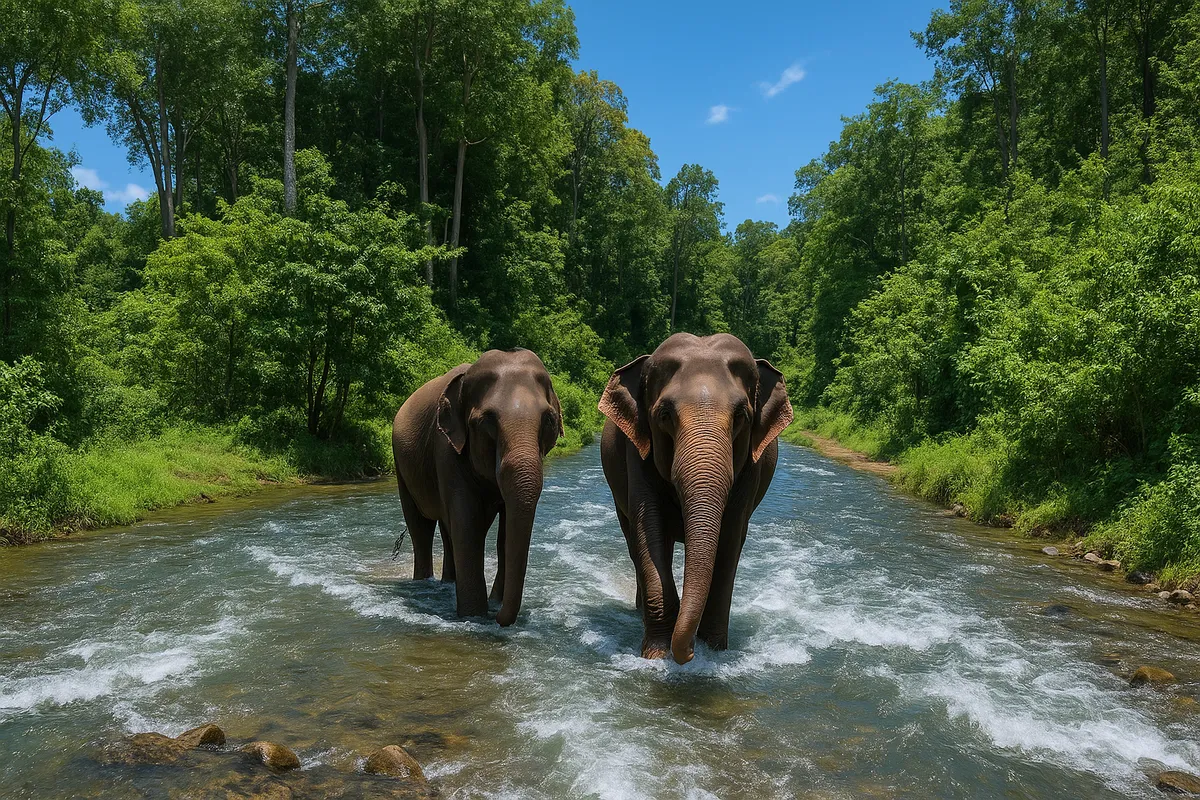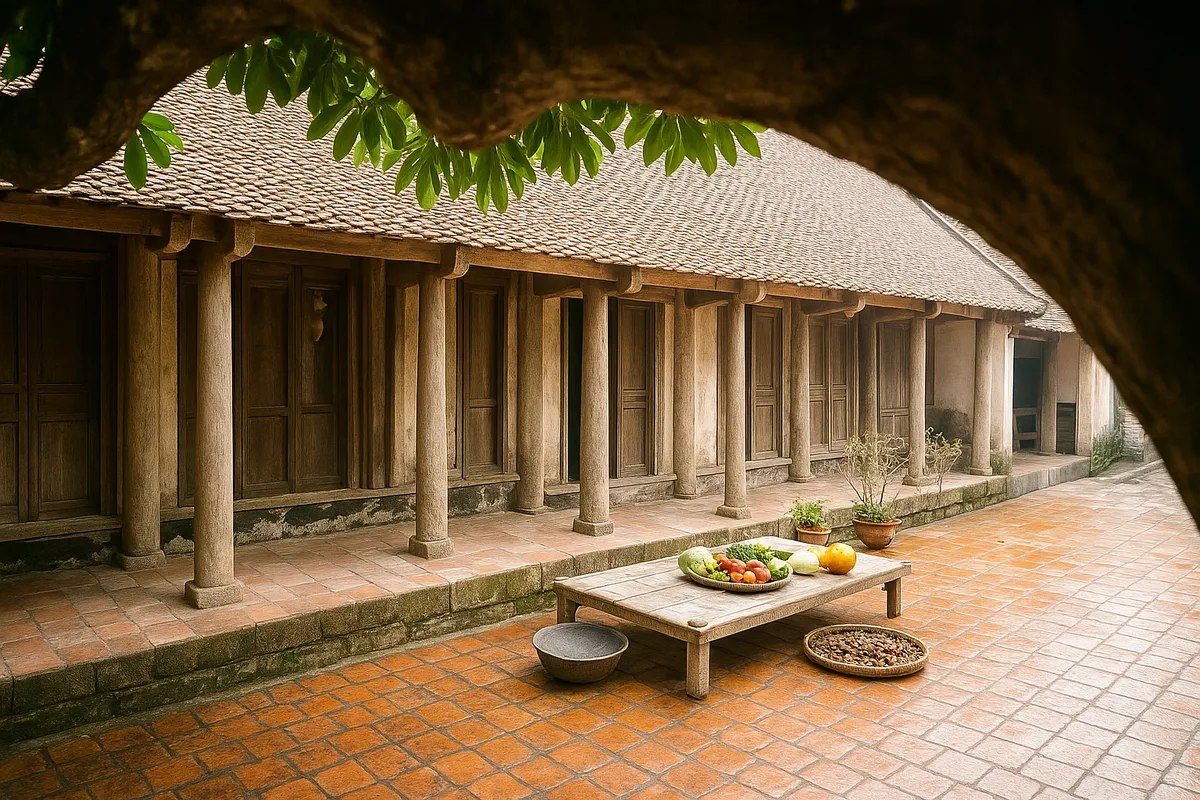Vườn quốc gia Yok Đôn - Giấc mơ giữa đại ngàn Tây Nguyên
- Thứ bảy, 03/05/2025, 09:40 (GMT+7)
Vườn quốc gia Yok Đôn - Giấc mơ giữa đại ngàn Tây Nguyên
Giữa đại ngàn Tây Nguyên, nơi gió rừng thổi qua những cánh rừng khộp xào xạc như một khúc hát hoang dã, có một vùng đất mang cái tên gần như bị quên lãng trên bản đồ du lịch đại trà, nhưng lại là nơi chốn linh thiêng của thiên nhiên và ký ức nguyên sơ. Vườn quốc gia Yok Đôn không đơn thuần là một cánh rừng, mà là một thực thể sống, nơi từng tán lá, từng dòng suối, từng dấu chân voi khắc lên đất đỏ bazan đều kể một câu chuyện về sự sống, về hoang dã, và về những điều mà con người hiện đại đang ngày càng bỏ lỡ.
Yok Đôn nằm trầm mặc ở phía tây bắc tỉnh Đắk Lắk, giáp ranh Campuchia, trải dài trên diện tích hơn 115.000 ha, là khu rừng đặc dụng lớn nhất Việt Nam. Nhưng điều làm nên vẻ đẹp lặng lẽ và kỳ vĩ của nơi này không chỉ nằm ở con số ấy. Đây là vùng đất duy nhất ở Việt Nam sở hữu hệ sinh thái rừng khộp, loại rừng đặc trưng của vùng khí hậu khô, hiếm thấy trong phần còn lại của dải đất hình chữ S. Mỗi mùa khô đến, từ tháng 11 đến tháng 4, rừng khộp rũ bỏ tán lá như một nghi lễ thay áo, để lại những lối mòn ngập lá vàng, rụng thành thảm dày như thêu, lấp lánh ánh sáng vàng mật dưới nắng cao nguyên. Có người đã từng ví Yok Đôn lúc ấy như một sa mạc vàng đang ngủ quên trong rừng.
Không gian nơi đây không ồn ào, không gấp gáp. Từ tiếng kêu xa xăm của chim công trống đến tiếng lao xao của những cành cây cao lặng lẽ va vào nhau trong gió, tất cả như nhịp thở đều đặn của thiên nhiên nguyên bản. Mùi đất khô ngai ngái, mùi nhựa cây đậm đặc và hương hoa rừng thoảng nhẹ trong gió, như lời thì thầm của rừng dành riêng cho những ai đủ kiên nhẫn lắng nghe.
Ẩn sâu giữa tán cây già hàng trăm năm là những cư dân trầm lặng của Yok Đôn. Không phải du khách nào cũng có dịp chạm mặt, nhưng ở đâu đó giữa tầng rừng ấy vẫn còn bóng dáng của voi châu Á, hổ Đông Dương, gấu ngựa, và những đàn khỉ lặng lẽ chuyền cành. Vườn quốc gia này là nơi duy nhất ở Việt Nam còn duy trì được mô hình voi sống tự do, không xiềng xích, không biểu diễn, không chở người. Những cái tên như Bun Kham, H’Blu, Y’Thuôi không còn là những con vật mang gánh nặng du lịch, mà là biểu tượng của sự tự do hiếm hoi giữa thế giới bị kiểm soát. Du khách có thể lặng lẽ đi theo dấu chân chúng, ngắm nhìn voi tắm sông, ăn lá, hay cọ lưng vào thân cây cổ thụ, trong một không gian tôn trọng và khoan dung.
Dòng sông Sêrêpôk là huyết mạch xanh của vùng đất này, như một vết cắt mềm mại vắt qua lòng Yok Đôn. Con sông chảy xiết, mang theo hơi thở của đại ngàn, chia cắt địa hình thành những dải đồi, rừng, thung lũng nối tiếp nhau. Truyền thuyết của người Ê Đê kể rằng, Sêrêpôk là hóa thân của mối tình bị ngăn cách giữa chàng trai và cô gái hai buôn làng, dòng nước ấy chính là lời thề chưa bao giờ cạn, cứ chảy mãi về phía hoàng hôn. Những buôn làng Ê Đê, M’nông, Lào sống rải rác quanh vườn quốc gia vẫn lưu giữ lối sống cổ xưa, nơi nhà dài bằng gỗ được dựng bằng tay, nơi tiếng chiêng hòa vào nhịp cồng rộn rã mỗi mùa lễ hội, nơi vị rượu cần đượm mùi thổ nhưỡng và ký ức.
Một trong những điều lạ lùng nhất ở Yok Đôn là rừng khộp vẫn bốc cháy mỗi năm vào mùa khô. Nhưng đừng sợ, đó là một phần của quy luật tự nhiên. Những đám cháy nhỏ giúp hệ sinh thái nơi đây được tái tạo, loại bỏ lớp thảm mục cũ, tạo điều kiện cho mầm non nảy nở. Người dân địa phương gọi đó là “lửa thanh lọc”, như một cách mà rừng tự chữa lành. Một fun fact ít người biết: rừng khộp nơi đây từng được các nhà khoa học ví như phiên bản Đông Nam Á của savan châu Phi, nơi đồng cỏ xen kẽ gỗ rải rác, mang đặc trưng của cả rừng và thảo nguyên.
Đi trong Yok Đôn không đơn thuần là đi bộ, đó là hành trình thiền định. Những tour trekking xuyên rừng mang lại cảm giác như bước giữa một vùng ký ức cổ đại. Mỗi tảng đá, mỗi thân cây mục đều là chứng nhân của hàng trăm năm biến chuyển. Lúc hoàng hôn buông, ánh sáng cuối ngày rọi xuyên qua tán cây cao như một vệt vàng rực, nhuộm cả khu rừng bằng thứ màu của mơ mộng. “Nơi rừng thay áo, lòng người cũng trở về nguyên bản” là câu nói mà nhiều du khách đã để lại khi rời Yok Đôn.
Đến đây, không cần lên kế hoạch quá tỉ mỉ. Mỗi mùa có một vẻ đẹp riêng. Mùa mưa xanh mướt và mát lành, còn mùa khô thì bùng cháy sắc nắng và sự hoài niệm. Từ Buôn Ma Thuột, chỉ cần đi về phía tây khoảng một giờ xe máy hoặc ô tô là sẽ chạm đến cánh rừng ấy. Nếu dừng chân nghỉ lại, hãy chọn một homestay gần buôn làng, thức dậy cùng tiếng chim, thưởng thức một bữa sáng đơn sơ nhưng đậm đà hương vị núi rừng, có thể là cơm lam nướng bên bếp than hồng, ăn cùng muối sả hoặc gà nướng lá chanh xé tay.
Đừng quên mang theo đôi giày tốt, một chiếc mũ rộng vành, một chai nước đầy và lòng kiên nhẫn. Yok Đôn không chào đón bằng sự phô trương mà bằng tĩnh lặng. Cũng đừng xả rác, đừng chạm vào cây cối hay bắt loài vật nào mang về, bởi mỗi thứ nhỏ bé ở đây đều là một phần trong bức tranh lớn của rừng. Một chi tiết thú vị khác mà không nhiều người để ý: Yok Đôn từng là nơi sinh sống của nhiều cặp vợ chồng voi hoang dã, và người Ê Đê tin rằng khi voi yêu nhau, rừng sẽ mọc thêm một cây mới. Có lẽ vì thế mà Yok Đôn luôn xanh, ngay cả trong khô cằn.
Giữa những ồn ào thị thành, giữa các xu hướng du lịch sống ảo dày đặc, Yok Đôn không vội vã chen vào. Nhưng chính sự trầm lặng ấy lại khiến nó trở nên đặc biệt. Như một người bạn cũ không nói nhiều, nhưng khi gặp lại, chỉ cần im lặng bên nhau cũng đủ thấy bình yên. Và có lẽ, chính điều đó làm nên sức hút kỳ lạ của nơi này.
Ở rìa rừng khộp, khi những tia nắng cuối cùng dập dờn trên ngọn cỏ, có một cảm giác rất lạ trôi ngang ngực: như thể vừa được rửa sạch mọi bụi bặm thành phố, như thể mình nhỏ bé nhưng lại kết nối sâu sắc với thứ gì đó lớn hơn. Không phải ai cũng hiểu điều ấy ngay lần đầu đặt chân đến Yok Đôn, nhưng ai đã chạm được, sẽ mãi không quên.
Chỉ cần lặng im, rừng sẽ kể cho nghe. Yok Đôn không cần phô diễn, vì chính sự lặng lẽ là lời mời gọi dịu dàng nhất.

 CHECKIN.VN
CHECKIN.VN








Chia sẻ trên